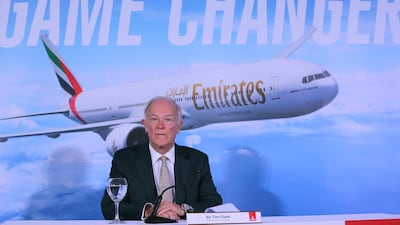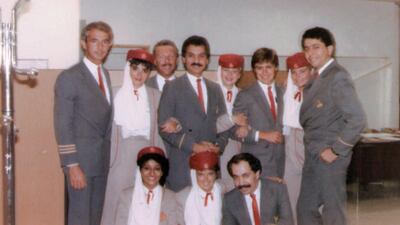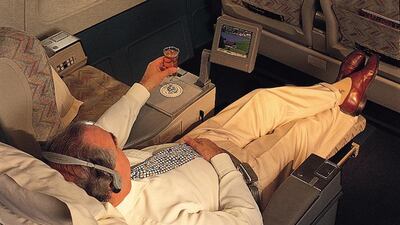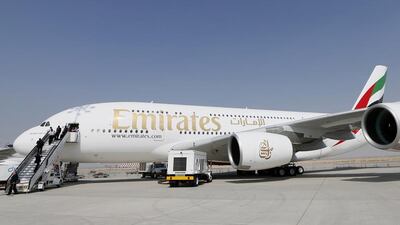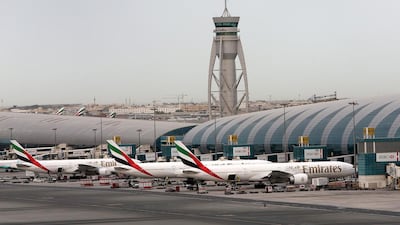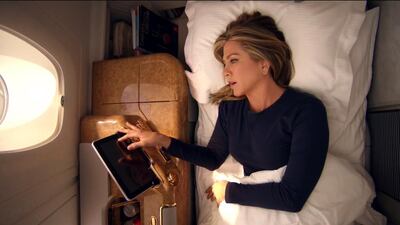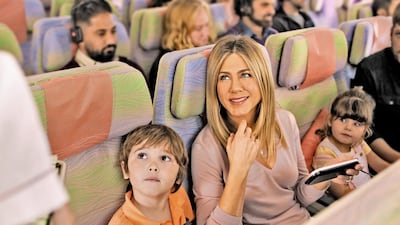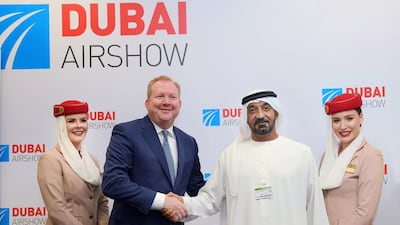Tim Clark, 70, long-time Emirates boss and titan of the modern aviation industry, is nearing the end of his 35-year service defined by bold gestures that transformed the airline from a two-plane operation into a global powerhouse.
The executive, who is retiring in June,
redefined the global aviation map as he masterminded the ascent of Emirates into the world's biggest long-haul airline, whose every move reverberates through the industry.
Mr Clark will remain with the company in an advisory role.
“He blazed the way for the ‘super-connector’ business model and found a willing partner in Dubai,” said George Ferguson, senior aerospace analyst at Bloomberg Intelligence.
“He had a great run.”
During his 16 years as president, the aviation veteran made Emirates the dominant airline on intercontinental routes connecting East and West with a fleet of Airbus A380 double-decker and Boeing 777 planes ferrying global travellers via its base in Dubai.
___________
Emirates' A380 liveries - in pictures
___________
The airline's growth helped transform the emirate into a mega-hub for international travel as part of the UAE's broader plans to diversify away from oil. Dubai International Airport has become the world's busiest airport in terms of international passenger numbers, taking the title from London Heathrow.
At the Dubai Airshow last month, Emirates chairman Sheikh Ahmed bin Saeed described Mr Clark as a "genius" at his job.
The executive, who joined the company in 1985, played a pivotal role in transitioning the airline from an operator of two jets leased from Pakistan International Airlines to a global aviation giant with a fleet of 270 aircraft flying to 159 destinations.
The airline behemoth has grown to wield significant influence over the development of aircraft programmes at both leading plane makers Boeing and Airbus. Mr Clark helped define the A380 and 777 jet family by dictating specifications according to those required by Emirates for its long-haul operations.
Emirates bet on its "super-connector" model to link city pairs worldwide, placing record-setting multibillion dollar orders for wide-body planes as it siphoned traffic away from well-established airlines.
___________
Emirates' humble beginnings - in pictures
___________
The Briton was appointed Emirates president in 2003, after which he navigated the airline through some turbulent times and industry changes during his tenure.
He guided the company through the 2008 global financial crisis, the 2014 oil price crash that clipped travel demand and dented its revenue, as well as various waves of geopolitical tensions across the Middle East and beyond.
He had to confront claims by US airlines that Emirates received government subsidies, therby preventing a level playing field for its competitors.
During the early days of US President Donald Trump’s administration, the executive dealt with a US ban on laptops aboard Middle East airlines.
He has also fended off competition from the "gathering storm" of emerging low-cost, long-haul airlines. To help challenge the threat, Emirates forged closer ties with sister budget airline Flydubai, which is also owned by the Dubai government.
In a no-nonsense approach, Mr Clark berated jet manufacturers and engine makers for faults that have delayed new plane deliveries, warning Emirates would no longer accept aircraft that did not meet set specifications.
The airline has been profitable during the past three decades, creating a top dividend-yielding entity for its government shareholder and realising Dubai’s plans to develop its tourism sector as a non-oil revenue generator.
Mr Clark is considered the godfather of the modern airline industry whose opinions on aviation and macroeconomic topics are well respected. He has expressed views on global issues from Britain's planned exit from the European Union and the US-China tariff wars to environmental issues and economic cycles.
Mr Clark is “the pre-eminent leader of the contemporary airline world”, said independent aviation consultant John Strickland. “A visionary, the brains behind Emirates and a massive influence on Airbus’ launch of A380 and Boeing 777-300ER.”
The executive is stepping down after conducting what he called a "root and branch" review of the airline's fleet and network, following an end to its flagship A380 double-decker in February.
He has since overhauled the Emirates fleet to embrace smaller wide-body jets amid a backdrop of slowing travel demand and sluggish economic growth. This culminated in a series of restructured deals at the Dubai Airshow last month that included the midsized Boeing 787 Dreamliner and Airbus A350 Neo jets, charting a new growth strategy for the company.
"By the early 2020s, Emirates will restart its expansion in no uncertain terms and we can do this with these aircraft, including 777X programme when it comes in," Mr Clark said.
His anticipated retirement comes at a time of a strategic review as the aviation industry faces global headwinds from trade conflicts to geopolitical tensions.
“He leaves at a time when the business is increasingly more difficult,” Mr Ferguson said. “Strong competition for connecting traffic and smaller, more fuel efficient long-haul aircraft that can serve more markets has depressed fares.”
Emirates has not named a successor to the veteran.
Before joining Emirates, Mr Clark was a route planner at Gulf Air and worked at Caledonian Airways. The airline executive holds a degree in Economics from London University in the UK and is a Fellow of the Royal Aeronautical Society.
